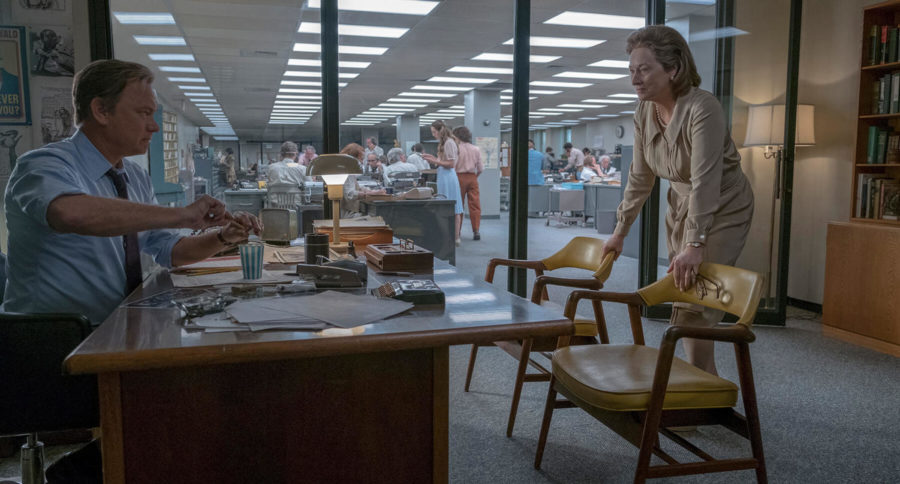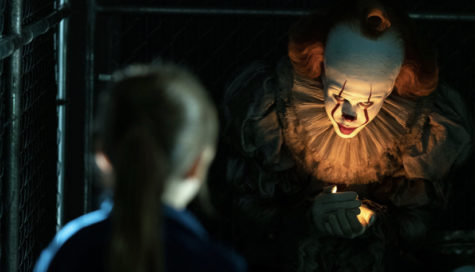Review: “The Post” creates suspenseful excitement while telling a historical narrative
The Pentagon Papers. Just the name sends shivers down the spines of government officials, and evokes a sense of pride in reporters from The Washington Post and The New York Times alike. As a historic event in politics, media coverage and journalistic ethics as we know it, a film depicting the first release of thousands of pages of a confidential study of the Vietnam War comes with high standards. However, “The Post” provides just the right punch to do justice to the legacy of reporting.
The film had a reputation before even premiering in theaters, combing arguably Hollywood’s best trio: actors Meryl Streep, Tom Hanks, and director Steven Spielberg. From its release on Jan. 12, “The Post” has earned about $30 million worldwide, grossing over half of its $50 million budget, and snagged six nominations at the Golden Globe awards.
Set in the 1970’s newsroom of The Washington Post as it just begins to go public, the movie details the difficult decisions faced by Post publisher Katharine Graham (Meryl Streep) and editor Ben Bradlee (Tom Hanks). After rival publication The New York Times obtains the infamous Pentagon Papers, the Times begin to release articles on the U.S.’s deep involvement with the Vietnam War, accompanied by evidence of government officials lying to the public. When an order is placed banning the Times from publishing further information, Graham and Bradlee begin a race against time to find the Papers and get a leg up in the reporting world, while also avoiding legal infractions and possible jail time.
If you had to read that summary twice to understand what was actually going on, brace yourself: the movie is even more complicated. Before walking into the theater, I read articles detailing the real-life events and identifying the “characters.” Because of this background knowledge, I was mostly able to follow the intricate storyline, but without it, I’m sure the gears in my head would have overheated in the first twenty minutes.
Nonetheless, the director is not at fault for this, for the real life events complicate the storytelling. There really was no better way to deliver the entire story in two hours without cutting out major plot points. Spielberg did incorporate elements to clarify who was who, such as the characters answering the phone by repeating their name (“This is Bradlee”). In fact, the pacing of events was extraordinary, with just the right amount of backstory, dramatic flair to build-up to the most thrilling events and sprinkles of humor along the way.
Not all credit can go to Spielberg, for the film’s success can also be attributed to the stellar performances by Streep and Hanks. Streep embodied the essence of a 1970’s female publisher, starting out timid but later developing into an empowering, courageous and intelligent woman. But she did not shy away from showing a vulnerable side accompanied by an emotional backstory as well. Meanwhile, the stubborn Hanks portrayed initiative of an expert editor, complementing and contrasting Streep perfectly. Their performances were so professional that I started to forget they weren’t the real life Graham and Bradlee.
I must confess, a historical film would not exactly be at the top of my list when visiting the theaters. Frankly, I can often lose interest in lengthy narratives. On the contrary, “The Post” kept my eyes glued to the screen, waiting in suspenseful excitement for the next decision to be made (even though I already knew the final result). It forces the audience to ponder their own opinions and put themselves in Graham and Bradlee’s shoes during one of the most influential decisions in Post history.
Looking for a relaxing movie to casual enjoy? You might want to reach for a classic Disney film instead. But for a striking film and an inside look into the world of corruption and scandals as well as a behind-the-scenes view of the past reporting techniques, “The Post” will keep your mind spinning and your curiosity flourishing.

Elise Mulligan is ready for her senior year at Naperville North. As Editor-in-Chief of The North Star, she has big shoes to fill but is excited to help...










